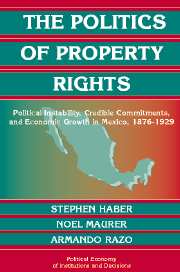 The Politics of Property Rights
The Politics of Property Rights Published online by Cambridge University Press: 02 December 2009
All governments – stable and unstable – face a commitment problem: if they are strong enough to arbitrate property rights, they are also strong enough to confiscate them. If the population does not believe that the government will refrain from exercising its power, then it will not invest. If there is no investment, there will be little economic activity, and there will be insufficient tax revenues to sustain the government.
The commitment problem is essentially a problem of contract enforcement. In a stable political system, a sovereign government offers property rights protection in exchange for some kind of benefit, typically a stream of tax revenues, from the holders of those property rights. The government and the asset holders assume contractual obligations, much in the same way that any two individuals or corporate bodies can. In a contract between two private parties, of course, the government, typically through the court system, ultimately serves as the third-party enforcer of the contract. A thorny problem arises, however, when the government is itself a party to the contract: the government has a monopoly over the enforcement of property rights but will only enforce those rights when it is in its interest to do so. Even if there is a promise of full enforcement, a sovereign government will be tempted to break it afterward. Private actors can, of course, anticipate government opportunism and therefore choose to invest less or not at all.
To save this book to your Kindle, first ensure [email protected] is added to your Approved Personal Document E-mail List under your Personal Document Settings on the Manage Your Content and Devices page of your Amazon account. Then enter the ‘name’ part of your Kindle email address below. Find out more about saving to your Kindle.
Note you can select to save to either the @free.kindle.com or @kindle.com variations. ‘@free.kindle.com’ emails are free but can only be saved to your device when it is connected to wi-fi. ‘@kindle.com’ emails can be delivered even when you are not connected to wi-fi, but note that service fees apply.
Find out more about the Kindle Personal Document Service.
To save content items to your account, please confirm that you agree to abide by our usage policies. If this is the first time you use this feature, you will be asked to authorise Cambridge Core to connect with your account. Find out more about saving content to Dropbox.
To save content items to your account, please confirm that you agree to abide by our usage policies. If this is the first time you use this feature, you will be asked to authorise Cambridge Core to connect with your account. Find out more about saving content to Google Drive.